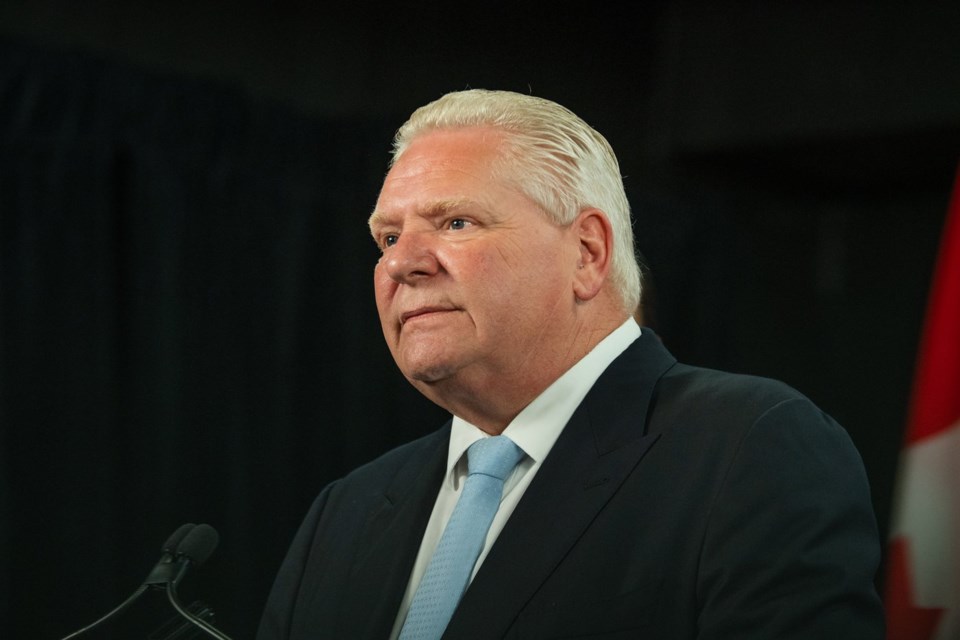TORONTO — Ontario is set to table its budget Thursday and Premier Doug Ford is signalling it will include a lot of infrastructure spending and measures to stimulate the economy, saying U.S. President Donald Trump's tariffs will be a major factor.
"We have to look at it through a different lens now, since these tariffs have been put on us," he said Wednesday.
"You have two options in a budget. You start cutting and slashing, which I've never believed (in). In tougher times, you go out there, you put money into infrastructure, keep building the hospitals that we're doing, and the highways and the bridges and the roads and the schools and long-term care homes and really building the infrastructure. We can always balance (in) a year or two."
The province's last major fiscal update, the fall economic statement, had eyed a balanced budget for 2026-27, but that came before the election of Trump and the implementation of tariffs. Ford is now suggesting that path to balance will be a bit different.
That was precisely the mandate he was given in the recent provincial election – which he called by saying he needed to ask the electorate before spending tens of billions of dollars in response to tariffs – said Karl Baldauf, partner at public affairs firm McMillan Vantage and a former chief of staff to Finance Minister Peter Bethlenfalvy.
"Everything is changing right now, and that goes for the fiscal situation of the province, the economic situation of the province, and even our culture as Ontarians and as Canadians, how we're viewing our neighbours to the south," Baldauf said.
"I think a lot of the narrative to the budget will be shaped by how does the province confront that threat."
Ford and Bethlenfalvy have already made a few announcements of what will be in the budget, including removing tolls from the eastern, provincially owned portion of Highway 407 and making a gas tax cut permanent.
It will also include up to $300 million to build up to 17 new and expanded community-based primary care teaching clinics in communities where high rates of people don't have a family doctor or nurse practitioner.
As well, the budget will include an expansion to a manufacturing investment tax credit, and deferring select provincial taxes for businesses for six months.
The government will also tout a $2-billion rebate the Workplace Safety and Insurance Board is issuing to safe employers as another way to protect jobs.
A recent report from Ontario's Financial Accountability Office said American tariffs will reduce demand for Ontario's exports, slowing real GDP growth from the projected 1.7 per cent to 0.6 per cent, which "implies that a modest recession would occur in 2025."
The FAO estimated that the tariffs would result in 68,100 fewer jobs in Ontario in 2025.
The effects on jobs and the GDP could vary by quite a bit, however, depending on whether existing tariffs, such as on steel, aluminum and automobiles, are reduced – or if additional ones, such as on copper or pharmaceuticals, are enacted. Canada's retaliatory actions would also play a role.
NDP Leader Marit Stiles said the budget is "a true test of this moment."
"Not only do we expect to see those infrastructure dollars being spent in areas of real, critical need in Ontario, but we want to see the government talk about how we're going to build new supply chains, how we're going to tariff-proof our province," she said.
"A lot of that also involves making sure that Ontarians have access to the best-quality health care, the best schools, a strong post-secondary education system."
Liberal Leader Bonnie Crombie said she hopes the budget includes tax cuts, like the ones she promised during the election.
"In addition, we're looking for more investment in education in the budget, especially funding for our colleges and universities that have been relying on foreign students that obviously have been cut back," she said.
"Then finally, not only affordability measures with respect to tax cuts, but also with housing."
Green Party Leader Mike Schreiner said he hopes the budget contains solutions that are grounded in reality.
"I don't want to see hundreds of billions of dollars wasted on a ridiculous tunnel under the 401 when we have cheaper solutions to traffic, like paying the tolls for truckers on the 407," he said.
The Ford government is seeking proposals for a feasibility study for the tunnel, but the premier has pledged to get it built no matter what.
This report by The Canadian Press was first published May 14, 2025.
Allison Jones, The Canadian Press



